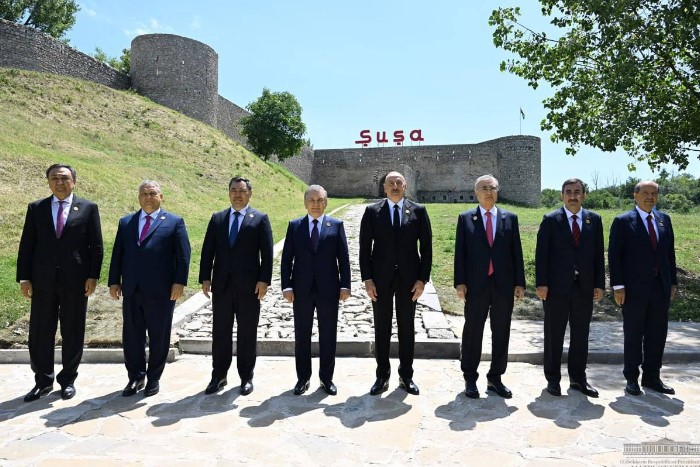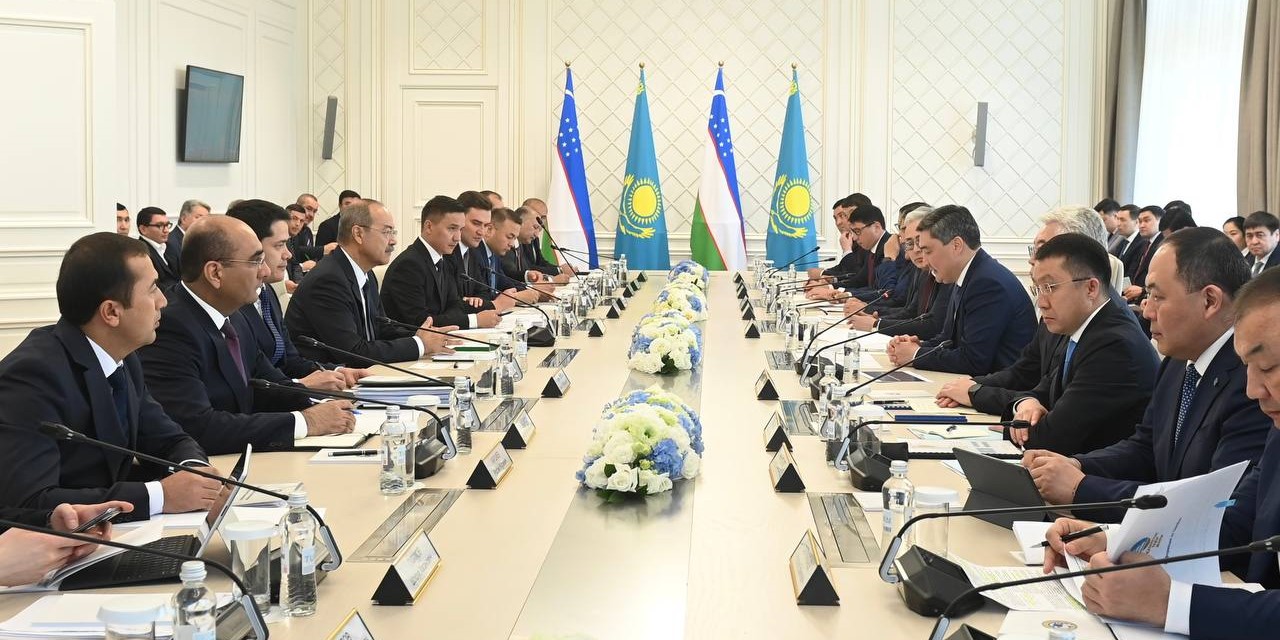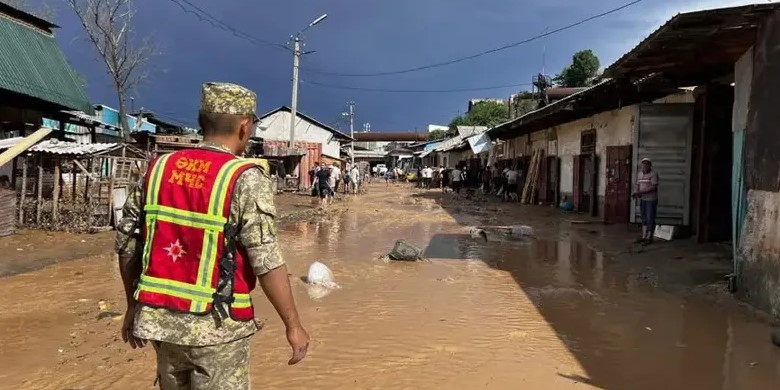This past week, regional media focused on several significant events including the informal summit of the Organization of Turkic States (OTS) in Shusha, the regional economic outlook report released by the Eurasian Fund for Stabilization and Development (EFSD), the free trade agreement between Kazakhstan and Uzbekistan aimed at increasing bilateral trade to $10 billion, an attempted coup in Kyrgyzstan, developments in the energy industry in the different countries of the region, efforts by Uzbekistan and Afghanistan to revitalize the TAPI Gas Pipeline project, and the widespread unseasonal floodings across Central Asia.

Informal Summit of the Heads of State of OTS concludes in Shusha, Azerbaijan. Source: TurkicStates.org
Informal OTS Summit
On July 6, the Organization of Turkic States (OTS) held an informal summit on “Building a Sustainable Future through Transport, Communication and Climate Action” in Shusha, Azerbaijan, with heads of government from Azerbaijan, Kazakhstan, Kyrgyzstan, Uzbekistan, Turkey, Hungary, Northern Cyprus, and Secretary General of the OTS in attendance. The meeting resulted in the adoption of the "Karabakh Declaration" and the signing of the "Decision of the Heads of State on Strengthening the Secretariat of the Organization of Turkic States (Tengri News).
Commending Kazakhstan’s current leadership and Azerbaijan’s initiative to organize the informal summit, the 31 clauses of the Karabakh Declaration emphasized the necessity of setting more ambitious goals for the OTS on the global stage. The declaration highlighted the importance of enhanced connectivity among member states, including improving transport infrastructure and trans-regional corridors. Specifically, it underscored the significance of regional connectivity and economic integration through projects such as the Trans-Caspian International Transport Corridor (Middle Corridor), the modernization of the Baku-Tbilisi-Kars railway line, and the anticipated contributions of the China-Kyrgyzstan-Uzbekistan railway project. On the climate front, the declaration called for the development of climate-resilient smart cities and villages, increased cooperation in environmental protection and climate initiatives, and the establishment of a permanent Turkic Environmental Forum at the ministerial level. Additionally, member states expressed deep concern over the catastrophic humanitarian situation in Gaza, condemned the indiscriminate targeting of civilians, and called for an immediate and permanent ceasefire, full compliance with international law, and a lasting settlement to the Israeli-Palestinian conflict on the basis of the Two-State Solution (President.az)
Economy & Finance
The Eurasian Fund for Stabilization and Development (EFSD), a major source of stabilization funding in the region, carried out a medium-term evaluation of its Strategy implementation for 2022-2026 across its six member states, namely, Armenia, Belarus, Kazakhstan, Kyrgyzstan, Russia, and Tajikistan. The report noted that key economic indicators for most member states exceeded expert expectations in the first quarter of the financial year, prompting EFSD to revise its 2024 economic growth and inflation forecasts upwards (excluding Kazakhstan) (Kazakhstan Today). Despite the lack of any severe threats to macroeconomic and financial stability, potential issues with international balance stability and budgetary funding gaps were noted. Previously, the EFSD had allocated funds for economic transformation projects in Armenia, Kyrgyzstan, and Tajikistan, with another program to promote institutional reforms in Kyrgyzstan currently under consideration (EFSD).
It was also reported during the week that Kyrgyzstan plans to resume services for Russian MIR bank cards. After the Russian National Payment Card System faced comprehensive sanctions from the U.S. and Europe, Armenia and Kyrgyzstan halted services for MIR in the spring of 2024 (Orda). However, Kyrgyzstan's Economy Minister Daniyar Amangeldiev announced that their Interbank Processing Center (MPC) is developing its own product which will allow the restoration of the use of MIR cards again.

The 21st meeting of the Uzbekistan-Kazakhstan Intergovernmental Joint Committee for Bilateral Cooperation in Almaty. Source: Press Secretary of Uzbekistan's PM
Trade and Investment
On July 11-12, the 21st meeting of the Uzbekistan-Kazakhstan Intergovernmental Joint Committee for Bilateral Cooperation in Almaty announced plans to increase bilateral trade to US$ 10 billion by transitioning to a full free trade regime and replacing imports from third countries. This is seen as part of a strategy to deepen economic integration, which will increase the ability of both countries to withstand the risks of global economic volatility (Daryo).
The Chairman of the Cabinet of Ministers of Kyrgyzstan Akylbek Zhaparov announced at the 25th Kyrgyz-Russian Intergovernmental Commission that Kyrgyzstan and Russia aim to increase their mutual trade turnover to US$ 5 Billion. The Russia-Kyrgyzstan Development Fund has financed over 3,000 projects totaling nearly US$ 690 million over the past decade, with promising prospects in the education and tourism sectors (Daryo). According to TASS, agreements "on particular business projects" have totaled a value of over US$ 3 billion during 2023 (TASS).
It was also reported during the week that in line with Kazakhstan's directive to attract transnational companies to its agro-industrial sector, the Ministry of Agriculture, in collaboration with NC Kazakh Invest, is currently overseeing 55 projects involving foreign investors with a total value of US$ 3.8 billion. These projects include an orchard and fruit processing plant in the Almaty region with Swiss company INOKS Capital and a $160 million PepsiCo salty snacks plant (Daryo).
Energy
Investment in Kazakhstan's green economy has reportedly reached 201 billion tenge ($418 million) in 2023, a 365% increase from the previous year. These investment initiatives target renewable energy, energy-saving technologies, and greenhouse gas emission reductions (Daryo). Kazakhstan currently has 147 renewable energy facilities, with 16 new facilities added in 2023, bringing the total installed capacity to 495.57 MW. By 2027, Kazakhstan plans to commission 25 additional renewable energy projects, totaling 599.85 MW, further solidifying its commitment to a sustainable and green future.
On July 2, Kyrgyzstan's Cabinet signed an investment agreement with Chinese company Junda for the modernization of refineries for the production of gasoline, diesel fuel, and liquefied gas (LPG) in the Chui area. With a total investment of approximately $167.95 million, the agreement aims to complete modernization by December 31, 2025, making it one of the largest investment projects in Kyrgyzstan to date (Globuc).
Elsewhere in Uzbekistan, representatives of the Uzbekistan Chamber of Commerce and Industry paid a visit to Bukhara Region to evaluate the development of the petrochemical cluster under construction by the Uzbek-Iranian joint venture Petrochem Sepehr. The facility is expected to cost $274 million and contribute $214 billion annually to the budget, providing around 600 jobs (Globuc). The project is scheduled to begin operations in the next two months.
The TAPI pipeline project resurfaced in the news this week as Turkmenistan's Ambassador to Afghanistan, Khoji Ovezov, and Afghanistan's Foreign Minister, Amir Khan Muttaqi, met in Kabul to advance the project. This project aims to transport 33 billion cubic meters of natural gas annually from Turkmenistan through Afghanistan to Pakistan and India (Daryo). Initially launched in 2016, the project faced delays due to Afghanistan's internal situation and other factors. It also includes increasing pipeline capacity and improving transportation and logistics connectivity.
Along the same lines, a spokesperson from the European Commission's press service highlighted Turkmenistan’s role as a significant partner for the EU within the Southern Gas Corridor (SGC). This major infrastructure project aims to transport gas from Azerbaijan to Europe via Turkey, diversify gas supply sources, reduce Europe's dependence on Russian gas, and enhance regional energy security (Daryo).
Logistics
The 15th meeting of the dialogue platform "Kazakhstan - EU" was held last week with the participation of Kestutis Jankauskas, the EU Ambassador to Kazakhstan, and heads of EU diplomatic missions. The meeting mainly focused on developing the Trans-Caspian International Transport Route (TITR) project (DK News). Also in line with Central Asia's indispensable role as a transport link between China and EU countries, a joint venture called "Middle Corridor Multimodal" was established at the International Financial Centre Astana (IFC), (Kaz Inform).
Elsewhere it was reported that a China-funded intelligent logistics training center in Almaty is set to be completed in October. Expected to provide courses for about 200 people by the end of the year, the center is co-developed by Urumqi Vocational University in Xinjiang, the Academy of Logistics and Transport in Almaty, and Chinese e-commerce giant JD (DK News). The center will serve students, employees of Chinese enterprises, and citizens of Kazakhstan who are willing to gain more knowledge about smart logistics.
Meanwhile, Uzbekistan's Ambassador Fariddin Nasriev met with Ali Akbar Safaei, Iran's Deputy Minister of Roads and Urban Development, to sign a number of memoranda on the exchange of electronic customs information and the movement of goods and vehicles across the customs borders. The two parties also agreed on implementing international freight and transit through the ports of Chabahar and Bandar Abbas and developing the "Uzbekistan-Turkmenistan-Iran-Oman" transport corridor (Kun Uz).

State of Emergency announced in Osh, Kyrgyzstan, following flash floods and mudslide. Source: Turanews
Climate Emergency
Floods in Afghanistan's Badakhshan, Kunar, and Panjshir provinces resulted in five deaths and significant economic losses. Mohammad Kamgar, the head of the Natural Disasters Management Department in Badakhshan, reported extensive damage to agricultural lands and infrastructure (Tolo News). In Kyrgyzstan, heavy rains and mudflows blocked the Osh-Sary-Tash-Irkeshtam road (24 KG). Kazakhstan is also facing days of heavy rain, hail, and strong winds across the vast country caused by cyclonic influences (Kaz Inform). Reconstruction efforts for housing units damaged by previous rounds of floods in Kazakhstan continue. In Petropavlovsk, for instance, flood-damaged houses are being demolished and rebuilt, with over 1,600 houses affected and more than 700 slated for repairs (Kaz Inform). Continued extreme weather events, however, are constantly impeding or interrupting satisfactory progress.
Security
On July 5, an attempted coup occurred in Kyrgyzstan, with a group attempting to incite unrest and seize power violently. The State Committee for National Security later reported seizing 70 firearms and 255,000 rounds of ammunition from the group, with 20 people currently detained (Kommersant). Speaking about the incident, President Sadyr Japarov noted that this group had also attempted a coup on January 15 of this year, allegedly led by individuals who used to steal from the treasury and evade taxes, potentially pointing to KG Group construction company head Imamidin Tashov and activist Tilekmata Kurenova, both wanted on suspicion of attempted coups (Kommersant). Meanwhile, on July 8, the Kyrgyzstan State Committee for National Security detained a smuggler in the Osh region, uncovering over 7 Kilograms of cannabis in his and his accomplices' homes. The detainee disclosed that some residents had organized a drug trafficking route along the Tajikistan-Kyrgyzstan-Uzbekistan corridor, indicating involvement by a large international drug trafficking gang (24 KG). The investigation still continues.

